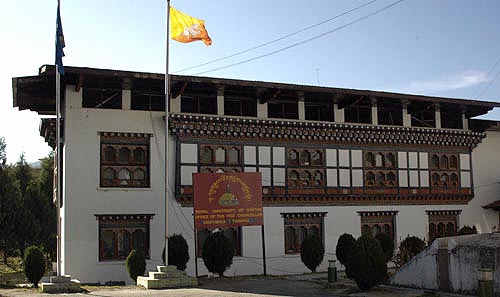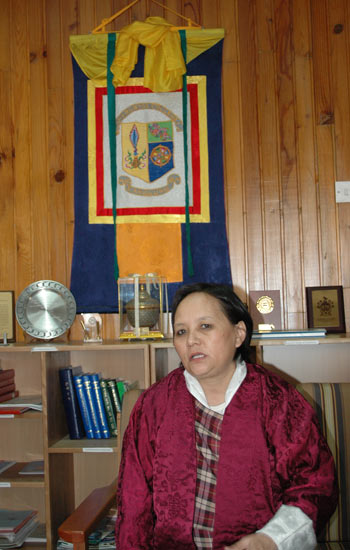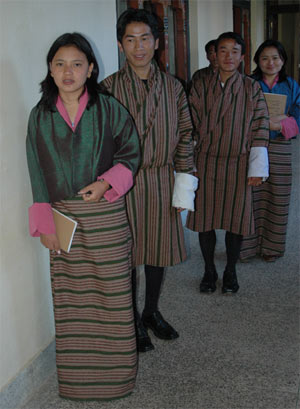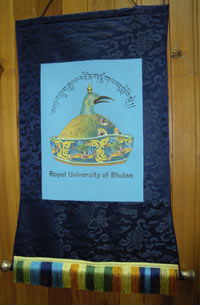SWEDISH SOUTH ASIAN STUDIES NETWORK
Visit to Royal University of Bhutan (RUB), Monday 28 November 2005

RUB web page: http://www.rub.edu.bt/
While planning the visit to Bhutan we had been in touch with Ms. Phintsho Choeden, Research Director at the Royal University of Bhutan (RUB). On behalf of the Vice Chancellor Mr. Dasho Zangley Dukpa she had expressed an eager interest to meet us. But as we arrived in the country it turned out that both Ms Choeden and the Vice-Chancellor were away from Thimphu, and no programme had been arranged for us to visit RUB.
Ms. Nim Dem, Director of the Dept. of Adult and Higher Education at the Ministry of Education, whom we met in the morning however kindly made it possible for us to visit RUB in the afternoon, and we went by car to Semtokha, five kilometres away from Thimphu, where the RUB administration building with the Vice Chancellor’s office is located.

There we were received by Ms. Kesang Doma, Registrar of the university (photo to the right), and had a meeting with her in the Vice Chancellor’s office. Ms. Doma informed us about the history of RUB, established as late as in June 2003, and briefly presented the nine educational institutions that are included under the umbrella of RUB.
Three institutions in Thimphu
 |
| Students at the Royal Institute of Management (RIM) in Thimphu. |
Four of the institutions are located within Thimphu. They are the Royal Institute of Management (RIM), established already in 1986, and located right near to the RUB administration building; the National Institute of Traditional Medicine (NITM) with only a very limited number of students; the Royal Institute of Health Sciences (RIHS), located close to the Jigme Dorji Wangchuk National Referral Hospital; and the Institute for Language and Cultural Studies (ILCS) in Semtokha.
Outside Thimphu are found the Royal Bhutan Institute of Technology in Rinchending, Phuntsholing; the two National Institutes of Educations in Paro and in Samtse; the College of Natural Resources in Lobeysa (offering diploma programmes in Animal husbandry, Agriculture and Forestry); and finally the Sherubtse College in Kanglung, Trashigang, an institution that has been a full-fledged degree awarding affiliate college of the University of Delhi since 1983, and has a large proportion of Indian teachers among its faculty.
 Altogether the nine institutions that form the Royal University of Bhutan
has a teaching staff of 337, out of which 79 are non-Bhutanese (mainly
in Sherubtse College), and the number of students in October 2005 was
3.553, out of which 125 are participating in post graduate programmes.
The largest institutions are Sherubtse College with 1.014 students, the
National Institute of Education in Paro with 744 students, the sister
institution in Samtse with 483, and the Royal Institute of Technology
with 446. The Bhutanese crown prince HRH Dasho Jigme Khesar Namgyel Wangchuck
is the Chancellor of the university.
Altogether the nine institutions that form the Royal University of Bhutan
has a teaching staff of 337, out of which 79 are non-Bhutanese (mainly
in Sherubtse College), and the number of students in October 2005 was
3.553, out of which 125 are participating in post graduate programmes.
The largest institutions are Sherubtse College with 1.014 students, the
National Institute of Education in Paro with 744 students, the sister
institution in Samtse with 483, and the Royal Institute of Technology
with 446. The Bhutanese crown prince HRH Dasho Jigme Khesar Namgyel Wangchuck
is the Chancellor of the university.
Royal Institute of Management
The Royal Institute of Management has a special status as it has its own charter and is semi-independent of RUB. Besides it offers no undergraduate studies, but only postgraduate. A special feature with most of the institutions is that they till 2003, when RUB was established, were very intimately connected to different ministries, e g the Ministry of Agriculture and the Ministry of Health.
Ms. Kesang Doma also informed us about the ambition of RUB to increase the number of International collaboration projects, so far very few and none with Sweden. Besides the long-standing connection between Sherubtse College and University of Delhi, there also exists a collaboration between the Royal Institute of Health Sciences and La Trobe University in Australia. The National Institute of Education in Paro is involved in co-operation with the University of New Brunswick in Canada, and the Royal Bhutan Institute of Technology has collaboration with the Indian Institutes of Technology in Kanpur and Kharagpur. Sherubtse College also has some collaboration with Wheaton College in USA. Recently the Vice Chancellor went to Austria, and discussed possible co-operation with the Institute of Applied Sciences in Krems. On the agenda was to initiate tourism research which would result in a tourism degree.
Traditional subjects
Traditional Bhutanese subjects play an important role in the RUB institutions. The National Institute of Traditional Medicine is a unique institution, striving to achieve excellence in the design, development and delivery of the so-called gSo-ba-Rig-pa education, to a handful of students every year. The Institute for Language and Cultural Studies focuses on Buddhist Philosophy, Bhutanese History and also Astrology, still considered of utmost importance in Bhutan. The study of social sciences on the other hand is almost non-existent. It is supposed to be on the curriculum at Sherubtse College, but the present and future plans presented for the College for the period 2006-2010 only mentions the launching of new programmes in Business Administration, Dzongkha (the national language), Computer Science, English, Economics, Science and Geography.
Before returning to the Jambayang Resort Hotel, for a comforting traditional Bhutanese stone bath in the evening, we made a quick tour of the Royal Institute of Management, met some students all dressed up in traditional Bhutanese dresses, and saw the impressing auditorium of the institute.
SASNET - Swedish South Asian Studies Network/Lund
University
Address: Scheelevägen 15 D, SE-223 70 Lund, Sweden
Phone: +46 46 222 73 40
Webmaster: Lars Eklund
Last updated
2009-04-15
